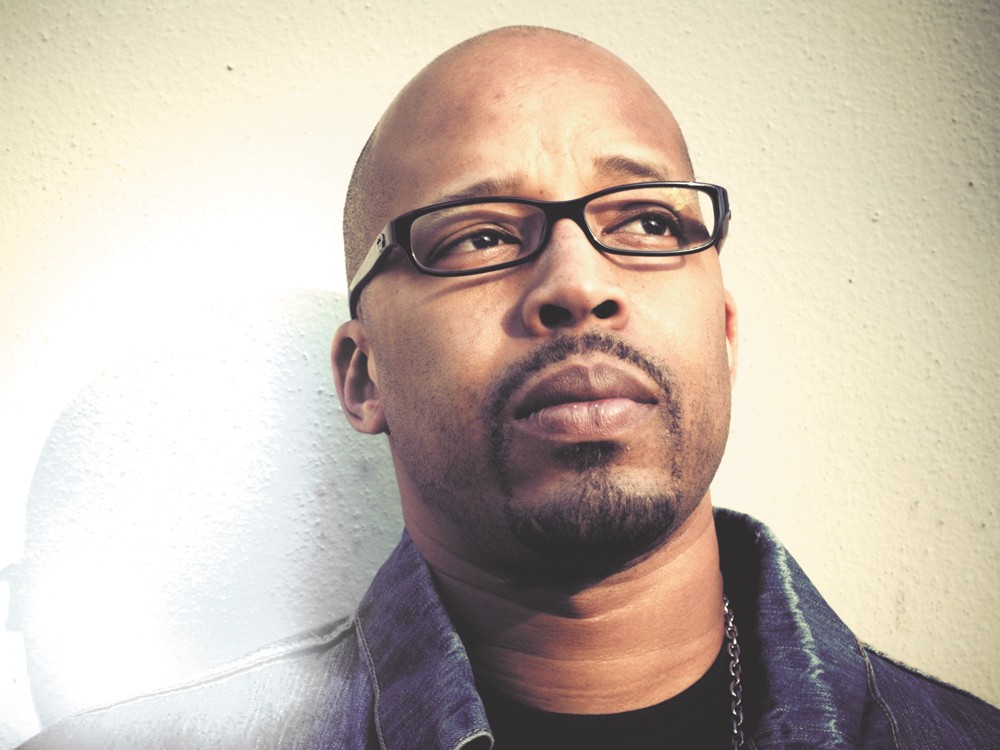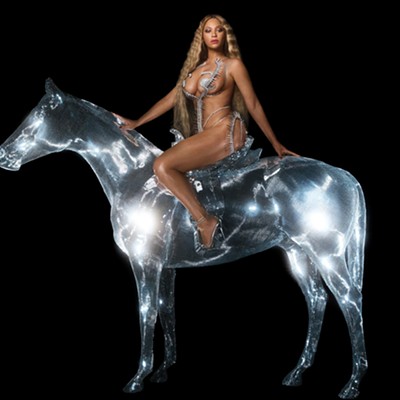“Two-hundred and forty pounds,” he deadpans, the words tumbling out of his mouth as she gives up.
Hudson proclaims himself an old purveyor of hip-hop in Moscow. Maybe that’s why he’s also one of the only people outside this small-town venue who seems to actually recognize the name Warren G. Even with the posters all over town advertising the notorious hip-hop artists’ upcoming show in the small bar, all anyone else says is that the name sounds familiar.
“I played his shit beyond belief,” says Hudson, as he hums and shuffles and throws his hands up in the air, miming how people used to dance.
Warren G’s debut album, Regulate…G Funk Era, sold more than three million copies and scored him a Grammy nomination in 1995 for its first track, “Regulate,” which he produced and performed with his musical cohort, Nate Dogg. However, despite his stunning previous success and a new single that dropped just last April, his endorsement of the “male enhancement” drug Affirm XL marks the brightest the spotlight has shined on Warren in years.
“As you can see,” Warren says, gesturing to five nearly naked women surrounding him on a bed in one of the product’s web ads, “I take my Affirm XL, and now I got to regulate.”
The response from both fans and media outlets was a resounding what is he doing? The ad was tacky and weird. After all, he did just reference his golden hit in a commercial for penis pills.
It brings to light just how much Warren G and his 18-year-old hit “Regulate” are inexplicably connected. It’s his brand, what people like Michael Hudson remember him by. But in an era of artists who tend to shy away from over-playing their previous work — like Radiohead’s refusal to perform “Creep” for so long — why is Warren G opting to embrace it? Does the song really have a pivotal place in the annals of hip-hop, or was it just a catchy song that has become nothing more than its creator’s catch phrase?
In the summer of 1994, Warren G and Nate Dogg released “Regulate,” a simple, first-person account of a night the two friends spent picking up chicks, smoking weed, getting robbed and eventually triumphing over gangsters in their Long Beach neighborhood. But the song, with its infectious hooks and Warren’s molasses-smooth voice, went on to take over the country.
“It was so big. I mean, in southern California, if you didn’t know every word to it, forget it. Like, what was wrong with you?” says Jeff Weiss, an L.A.-based freelance music journalist who regularly writes for the Los Angeles Times and LA Weekly, over the phone.
The album went on to go triple platinum, catapulting Warren and his collaborators Nate Dogg (who died of a stroke last year), Snoop Dogg (who, following conversion to Rastafarianism, now goes by Snoop Lion) and Dr. Dre (Warren’s step-brother) into the mainstream, where hip-hop had yet to gain much of a hold.
The then-struggling Def Jam Recordings took on the task of distributing the album — a move that would serve as the ultimate display of what Weiss terms the “economic effect of Warren G.”
“The success of ‘Regulate’ basically saved Def Jam,” says Weiss. “So not only did he bring Snoop to Dre, he brought Nate Dogg to Dre, produced a beat or two on Doggy Style, made his own classic album; he probably saved the most iconic label from failing. It could have been anybody, but it wasn’t. It was Warren G.”
Adam Bradley, University of Colorado English professor and co-editor of the Anthology of Rap, argues that “Regulate” shouldn’t be seen as a barrier to Warren’s new success, but an asset.
“There’s something really savvy about embracing that, and seeing its potential — its potential to expand your own brand, its potential to keep you in the public eye even long after that peak of pop success,” Bradley tells The Inlander. “‘Regulate’ is such a memorable song, such an important one in ‘rap as pop music’ that it would be foolish for him to run away from it. …
“[But]Warren G’s relationship to that song being such a huge hit is kind of double-edged,” he adds. “People who only know Warren G from ‘Regulate’ are kind of missing out on one of the really crucial figures in West Coast hip-hop.”
Tom Scott, co-owner of John’s Alley, where Warren will be performing on August 31, says it’s the venue’s reputation that prompted Warren G’s people to request a show there. Scott is not supposed to say how much they’re paying to bring him to Moscow, but it’s more than usual. He expects the show to sell out.
“It’s exciting when you have someone like that in a tiny little place like this,” he says.
Warren isn’t touring at the moment, and hasn’t in some time. And even though he may be making some good money at the Alley, hip-hop journalist Jozen Cummings, a former editor at Vibe and XXL who now works for the New York Post, suspects that it’s not just a paycheck for him.
“I think that we’re too quick to put a lot of these older artists out to pasture,” Cummings says. “You may not have Warren G’s last album … nothing he does will ever be as big as ‘Regulate,’ but the fact that people who weren’t even born when that song came out [are listening to it], it reminds him of the impact he once made.”
Warren G • Fri, Aug. 31, at 9:30 pm • John’s Alley • 114 E. Sixth Street, Moscow • $27 • 21+ • alleyvault.com • (208) 883-7662
















